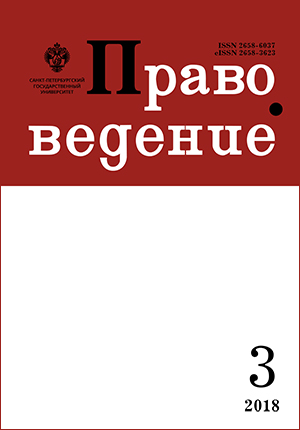Professional and educational standards in jurisprudence
DOI:
https://doi.org/10.21638/spbu25.2018.302Abstract
The issue of standards of legal activity is relevant for Russia, however, there is no general understanding of what should be standardized and how. In this case, the central element of the condition for admission to legal activities (as a general rule) is the presence of a vocational (legal) education. The authors in the system vein consider the issues of conjugation (correlation) of educational standards and professional standards in jurisprudence as components of the national system for the development of professional qualifications in Russia. The article presents the arguments in favor of the non-direct (non-linear) nature of the relationship between professional and educational standards for: the purpose of their creation; characteristic of constituent elements; the obligation of their implementation by the participants of public relations; time gap in assessing the structure and qualification indicators of graduates and employees. It is concluded that, in fact, the conjugation of standards is not a determining mechanism for managing the development of qualifications, but only an integral part of a wider mechanism — the inclusion of employers (other customers for the training of professional personnel) in the process of implementation by educational organizations of basic educational programs. In this regard, in relation to the field of jurisprudence is proposed a foresight sphere of employment. Outcome of foresight (through the common efforts of the professional community of lawyers and experts in the field of higher professional education) should be the construction of a common “professional core of legal qualifications” or “core of the legal profession”. Thus, it will be possible, firstly, to identify the core of competencies as the basis of the profession called “lawyer”, secondly, to identify the species differences that may provoke the professional community to design relevant professional standards, professional practices framework, quality standards of individual types legal services. Since there can be no linear transition of qualifying requirements and ways to identify them between educational and professional standards, then a different concept and logic of standardization of education is needed. The authors of the article propose legal and social mechanisms for constructing such a concept.
Downloads
References
Baranova, Iuliia. 2017. The role of standards in ensuring the quality of legal services for the public. Baikal Research Journal, vol. 8, no. 3. https://doi.org/10.17150/2411-6262.2017.8(3).14 (In Russian)
Dobrokhotova, Elena, and Lavrikova, Marina. 2017. The quality of vocational education — compliance with the demand of the labor market. Kachestvo obrazovaniia 4: 46–53. (In Russian)
Dobrokhotova, Elena (ed.). 2017. Professional skills of a lawyer: a textbook for an academic bachelor’s degree. Moscow, Yurait Publ. (In Russian)
Downloads
Published
How to Cite
Issue
Section
License
Articles of "Pravovedenie" are open access distributed under the terms of the License Agreement with Saint Petersburg State University, which permits to the authors unrestricted distribution and self-archiving free of charge.




